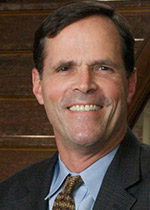The Committee of Seventy
"The value is in the name…."

After an infamous magazine article described Philadelphians as “corrupt and contented,” the Committee of Seventy was established in 1904 by a group of public-spirited business leaders to combat corruption and promote effective governance in Philadelphia. Over the years, the organization played a major role in the adoption of civil service reforms, the passage of the city’s Home Rule Charters, and in securing new campaign finance limits and ethics laws after a wave of public corruption in the early 2000’s.
Today, this nonpartisan nonprofit advances representative, ethical and effective government in Philadelphia and Pennsylvania through citizen engagement and public policy advocacy. Seventy keeps the public engaged and informed through creative use of social media, its Twenty by Seventy podcast, innovative apps like WeVote, and regular issue and candidate forums. Whether advocating for campaign finance reforms, fairer elections and greater transparency or fighting pay-to-play politics and gerrymandered districting, the organization’s staff and board members have a vision of better government that citizens can trust.
David Thornburgh, who was named President & CEO in 2014, has known about Your Part-Time Controller almost since the company’s inception and has referred several nonprofits to YPTC. “I think the value is in the name,” he says. “You get to a certain size as an organization where you’re capable of handling the day-to-day bookkeeping but you need someone else to serve as a part-time controller to give you insights into the larger strategic questions facing your operations. Sometimes you need someone to advise you and your board on the higher-level choices you could make. An outside advisor gives you a level of trust and confidence so you can stand by your numbers and your organizational outcomes and present them with confidence to your board, your funders and the news media.”
Such confidence is particularly important for the Committee of Seventy. “We have long embraced the value of transparency and integrity when it comes to elected officials, public agencies and local governments,” he notes. “Therefore, it’s even more important that we not just ‘talk the talk’ but also ‘walk the walk.’”
Over the years, Thornburgh has worked with many YPTC advisors in a number of different organizations. “There’s a level of consistency and quality that I’ve come to expect so I’m not anxious whenever there’s a staff transition,” he says. “I have great confidence that YPTC understands the need for high standards and recruits and trains their people well. They can’t have their clients go on a rollercoaster ride when it comes to the quality of their people. That commitment starts at the top.
“It’s impressive to see how YPTC’s footprint has grown over the years as they’ve expanded into new markets, but that rapid growth hasn’t come at the expense of servicing the clients back in their old home town. That’s quite a feat.”





